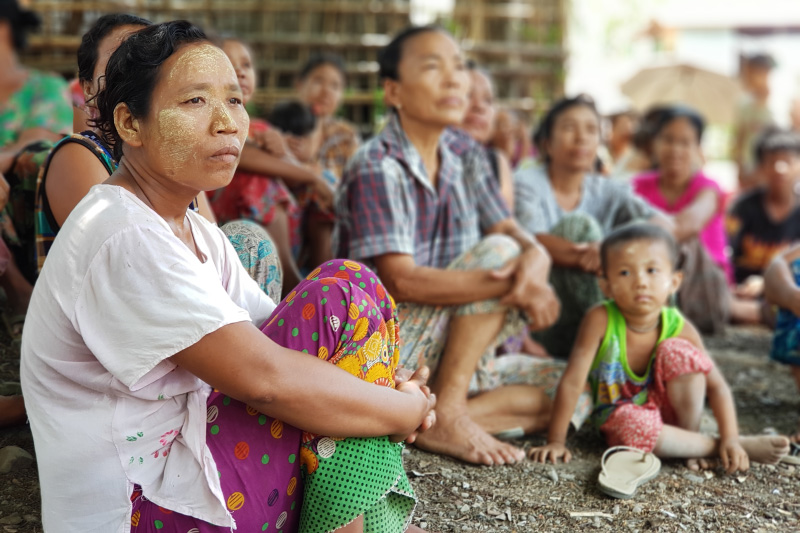”This is a lose-lose situation for people”
Statement from ICRC President Peter Maurer following his visit to Myanmar and Bangladesh. I am leaving this region with a sober assessment of the situation here.

I travelled to both sides of the border – to the northern parts of Rakhine State where people had fled violence in huge numbers and to the camps of Cox’s Bazar.
I met those who stayed and those who left and it is clear that people are suffering on both sides. People lack secure housing, electricity, latrines, medicine and health care. There are few options for people to earn an income to allow them to move beyond aid and emergency conditions.
Over a million people live in misery, held hostage to a profoundly unsettling contradiction.
Those sheltering in the camps of Cox’s Bazar live in shocking conditions that violate human dignity. With the monsoons arriving, their lives will only get worse. They cannot stay and they cannot return.

I cannot claim that life for those in Rakhine State is significantly better. In this remote, rarely-visited area, we drove through the areas where villages once stood. Little remains now, and the vegetation is rapidly reclaiming the land. In other parts, former schools and health centres stand empty.
In one village I visited, less than a quarter of the population remains, only 2,000 of the original 9,000 villagers. I spoke with all communities - Muslim, Buddhist and Hindu. They described how the social fabric and local economy have been destroyed, making people entirely reliant on humanitarian aid.
The conditions are simply not there for large numbers of people to return home.
If I look at the landscape today, I cannot help but think: in 20 years’ time will we find ourselves in exactly the same place as we are now, with huge numbers of people still scratching out a desperate existence in these camps? The children I met deserve a better future. They must not become a new generation living in ‘emergency' conditions.
We owe it to them to avoid this outcome. For humanitarian reasons alone, something has to change. Our collective best efforts must break this intractable situation and address its root causes. The ICRC is keen to play its part.

Our colleagues on both sides responded as quickly as possible after the crisis began in August 2017. As one of the first responders in Cox’s Bazar, the ICRC has been able to meet the most urgent needs of people living along the border areas including the host communities.
In Myanmar we are doubling the distribution of food rations, to help communities during the monsoon season as many areas become inaccessible.
These are lifesaving measures but they are not long-term solutions. People need sustainable answers and they need hope for the future.
Efforts of all actors are being stretched, and resources are getting scarce. Host communities in Cox’s Bazar, who opened their arms to welcome displaced people despite having very little themselves, are overwhelmed as well. Our micro-economic initiatives, launched last week, will support their income-generation activities and eventually overcome their economic struggles.
But humanitarian assistance alone will not solve this problem. A better future for the people here will need inclusive political solutions, environmentally sustainable economic investment and a strong commitment to international humanitarian law and human rights.

I am not here to apportion blame. There has been no shortage of initiatives to solve the problem. Both governments are making efforts and I’m convinced of their goodwill. During my visit I was able to meet with H.E. Daw Aung San Suu Kyi, State Counsellor, and H.E. U Win Myint, President of Myanmar, and Senior General U Min Aung Hlaing, Commander-in-Chief of the Defence Services, as well as with H.E. Sheikh Hasina, Prime Minister of Bangladesh. A meeting with H.E. Abul Hassan Mahmood Ali, Minister of Foreign Affairs of Bangladesh, will take place today before I return to Switzerland.
We’ve also seen the excellent recommendations from Kofi Annan's Commission, which we support. Humanitarian organisations too are doing their best to alleviate the suffering.
But so far, despite all the talking and all the efforts, too little has changed for the people there.
Conditions to return will require not only humanitarian and mitigating activities, but also effective political steps towards ensuring freedom of movement; access to basic services; freedom to undertake economic activity and access to markets in Rakhine; and most importantly trust in security arrangements for returnees.
In both countries I visited I was moved by the stories about the impact of ICRC’s work for individuals and communities over the decades, from detention visits to health care to humanitarian negotiation and diplomacy. The ICRC will continue to play its part in responding to this humanitarian crisis in both Myanmar and Bangladesh.
Support our Bangladesh-Myanmar Crisis Appeal
Charity donations of $2 or more to Australian Red Cross may be tax deductible in Australia. Site protected by Google Invisible reCAPTCHA. © Australian Red Cross 2024. ABN 50 169 561 394